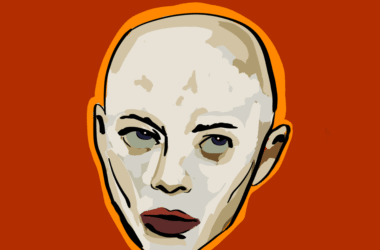 Adam Scotti
Adam Scotti“I like what I got, and I’m gonna protect that. Wouldn’t you?”
After Steph finds out that her boyfriend Greg has just called her face “regular,” she delivers the play’s first monologue, in which she explains why, though still clearly in love with Greg, she had to go through with the breakup. Steph, like the other three characters in Neil Labute’s Tony-nominated play Reasons to Be Pretty, is grappling with society’s simultaneous espousal of the notion that beauty is only skin-deep and yet its promotion of impossible standards of beauty—for which each of us, unwittingly or not, is responsible.
Performed by Players’ Theatre and directed by David Armstrong, Reasons to Be Pretty explores one of the most clichéd—yet also the most ubiquitous and far-reaching—contemporary social issue: our obsession with beauty and physical appearance. The plot centres on four working-class friends and lovers, Steph (Alexandra Montagnese), Greg (Martin Law), Kent (Alex Gravenstein), and Carly (Bea Hutcheson), who each meet dead-ends as they become increasingly absorbed in vanity, jealousy, and insecurity.
When she overhears Greg telling Kent that, unlike the hot new girl at work, Steph’s face is merely “regular,” Kent’s wife Carly immediately tells Steph. Carly, who is more physically attractive than Steph (at least by societal standards) has her own tornado in store when she soon learns that Kent is cheating on her with the new girl. Unsurprisingly, these acts lead to arguments and miscommunication, and the play is riddled with an almost exhausting slew of shrill screaming matches between the friends and couples.
But women aren’t the only victims of society’s arbitrary standards in Labute’s play. In one telling scene, Kent—a somewhat two-dimensional stereotype of a douche bag—tells Greg that he shouldn’t be eating a calorie-ridden Power Bar after he has just eaten an entire meal if he intends to “stay in shape” for the work baseball team. While the dialogue seems overly simplistic, it is not difficult to imagine a similar interaction occurring in real life.
In one hilarious sequence, Steph gets up on a chair in the middle of a crowded restaurant to enumerate all of Greg’s physical qualities that she detests, from his “mother’s nose” to his “toenails that might as well be fingernails.” Though Steph is merely trying to hurt Greg as much as he hurt her, the very content of the list suggests that she is as much preoccupied with standards of beauty as Greg. As this is the first time Steph has ever bemoaned Greg’s physical attributes, her rampage also emphasizes that, in relationships, much is often left unsaid.
Unlike the plays of, say, Ibsen or O’Neill, the charm of Reasons to Be Pretty lies not in its ability to intellectually engage or challenge its audience. Instead, Labute’s characters speak mostly in crude vernacular. But just as the audience is jarred by their vulgar language, so too do the characters struggle with verbalizing what they really mean, or even deciding what it is they mean in the first place. We can all relate to awkward, stilted conversations with exes that exhibit anything but eloquent dialogue.
While somebody like Carly is certainly presented more sympathetically than Kent, he remains a sadly realistic depiction of human folly and frivolous preoccupation. In his own monologue he says, “Behind every pretty girl is a guy who’s tired of fucking her. Once you get the pretty girl, all you do is worry about keeping her.” Although he’s the perpetrator of infidelity and classic male faux pas, even he acknowledges the extent to which he is caught up in superficiality and its discontentments.
In a clever move on the part of the director, the four characters stand on what look like mounds on a baseball diamond to deliver their respective monologues. As baseball is a running metaphor throughout the play, it is fitting that the characters’ in-depth exploration of their own consciences are situated within a larger game. Furthermore, the band—though only consisting of a cello, tenor sax, and alto sax—adds an integral comedic effect and cadence to the players’ staggered musings.
Reasons to Be Pretty won’t illuminate anything you didn’t already know, but it’s an experience in itself to recognize aspects of yourself reflected on the stage.
Reasons to Be Pretty is playing at Players’ Theatre, October 20-23. Tickets are $6, and can be reserved at http://ssmu.mcgill.ca/players/






